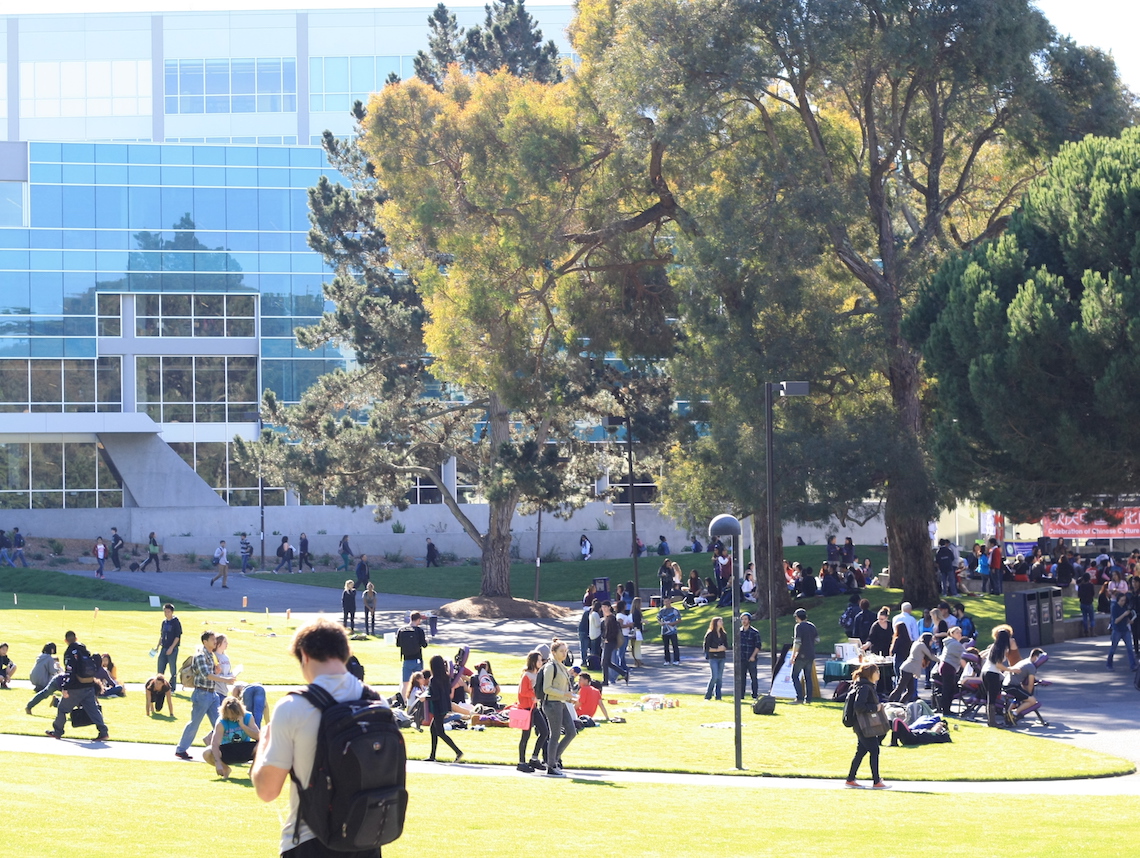 San Francisco State University
San Francisco State University San Francisco State University (SFSU) has had a problematic reputation for decades in certain Jewish circles. The campus has been considered unfriendly to Zionism and, at times, to Jewish life in general.
Jewish faculty and community leaders now say the problem has grown worse. And they hold the university responsible, accusing the SFSU administration of unequal treatment, silence and delay in protecting the safety and free speech rights of Jewish students.
The critics also contend that anti-Zionist animus over the last year has at times crossed the line into anti-Jewish acts and expression, and that the administration has been tepid in response.
In an April 12 email to SFSU President Leslie Wong, members of San Francisco Hillel went so far as to accuse the university of “institutional anti-Semitism.” Some lay the blame directly at Wong’s feet. They say bias against and ostracizing of Jewish and pro-Israel students on campus has intensified during Wong’s tenure, which began in 2012.
Wong and other SFSU officials deny those accusations, saying they take the community’s concerns seriously.
“I am concerned about our Jewish students,” Wong said. “I do worry about anything that would convey any attempt to silence anyone. Not only is the campus tense in terms of anti-Semitism, it’s tense around a lot of ‘isms’ on campus. I wouldn’t pick anti-Semitism as saying it’s our only problem, but I think it is a significant issue we are trying to confront.”
The critics, however, insist that Wong has failed to provide leadership.
A watershed moment occurred on April 6, 2016, when anti-Israel protesters led by the General Union of Palestine Students (GUPS) shouted down Jerusalem Mayor Nir Barkat during a Hillel-sponsored appearance, chanting through megaphones, “Get the f— off our campus.”
Police and administration officials on the scene issued verbal warnings to protesters, which were ignored; they did nothing else to intervene, allowing the disruption to continue unabated.
Wong, 67, publicly decried the incident and ordered an independent investigation, whose findings were published last August. The report chided SFSU student affairs for not consulting with Hillel and others in advance, and for allowing similar disruptions in the past “without ramifications for the offenders.” But no protester faced disciplinary action.
Jewish voices on campus and off spoke out against the administration’s perceived inaction. In an effort to repair the damage, Wong met a half-dozen times with prominent figures from SFSU’s Jewish studies department and the broader Jewish community.
J.-The Jewish News of Northern California (jweekly.com) has acquired dozens of documents dating from April 2016 to April 2017, including correspondence between Wong and Hillel students, memos, emails, agendas and unofficial minutes of meetings. The documents suggest that Wong, though sympathetic to Jewish concerns, resented the amount of time they took up, even as Jewish leaders pressed him to take more decisive action in protecting Jewish students and to publicly denounce what they see as a de facto policy of anti-normalization of Zionism on campus — which, they say, prevents positive views of Israel or Zionism from being freely expressed.
“We have been trying to get the president of the university to take a clear and public stand that anti-normalization has no place on campus,” said SFSU Jewish studies professor Marc Dollinger. “It’s, in fact, against the very mission of the university. If the approach is not to talk to someone with whom you have a political disagreement, then we’re not a university.”
Of anti-normalization, whose proponents refuse to acknowledge or “normalize” the State of Israel or Zionism, Wong said, “I am the first to say it is an issue,” adding, “I told [Dollinger] I need to read more about this anti-normalization so I can ask about the limits of this.”
Jewish concerns have been marginalized at the school, critics charge. As an example, Dollinger and his colleagues point to a Feb. 28 information fair on human rights called Know Your Rights. They claim event organizers surreptitiously changed the registration cutoff date in order to exclude Hillel from participating. The matter is under investigation by the university.
“Many of us feel a tremendous sense of urgency,” said Luoluo Hong, SFSU vice president of student affairs. “I feel personally responsible when we have students who express distress or concern about campus climate. There are definitely Jewish students who have expressed stress.”
Critics also slam the slow progress on procedural changes mandated after the 2016 shout-down of Barkat; they say it’s taking too long to implement those changes.
Wong disagrees. “I don’t know if it’s taking so long,” he said. “We’ve been pretty rigorous about looking at the policy and asking ourselves where did it come up short, where does it need to be updated and how does it comply with [California State University] system rules. We’ve initiated staff training, we have an emerging leaders program. We’re not done.”






















 More news and opinions than at a Shabbat dinner, right in your inbox.
More news and opinions than at a Shabbat dinner, right in your inbox.